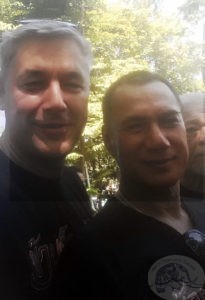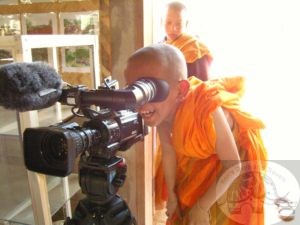Of Language and Movies
“Have you been drinking?”
Excuse me?
“You smell like a brewery!”
I haven’t touched a drop of alcohol for like two days.
“Well you smell like you’ve just consumed the entire bloody distillery.”
I was stunned. I seriously hadn’t had a drink in days, although the last party on the Friday night had been a smashing success, with most people needing all day Saturday to recuperate – me included.
Then I realized what must certainly have been the cause of the question. The Friday night party had started with a wedding dinner, and from there it just went on into the night. There really doesn’t need to be much of an excuse for a party to happen: birthdays, funerals and the gambling that went on behind the temple as soon as the monks had finished their chants, weddings, pay day, someone becoming a novice or a monk; just about any excuse was good, and there were plenty of temples around with constant events that the excuses weren’t hard to find. At most of these events, after the first bottle of ‘higher’ quality spirits had been consumed, the rotgut came out, the rice whiskey. Today, if I were to get a smell of it, I would probably throw up, and it really does stick to your body for a few days after you have had a bit too much of it, and I suppose that on this particular Friday evening, there just had been too much local whiskey that by Monday morning, the question should not have surprised me. Even so, I foreswore future reckless intake of the liquid because I certainly didn’t want to be considered a walking brewery.
Drive-in Movies, Thai-style
Actually, speaking of temples and the numerous events, they were a blessing in disguise, despite the potential for consuming too much alcohol. It was fashionable for organizers or hosts of the various events to show anywhere from three to five movies at these events. The wealthier the patron, the more movies, and the higher the quality of those movies. Many a night I would join friends and watch several films in a row. In the 1980s there was still a large demand for the services of owners of mobile projection systems – often converted buses or trucks with all the equipment necessary for an outdoor screening. We would know by noon of any particular day at what temple a movie would be shown; driving through the countryside and passing by the temples you could see the large trucks parked, and a number of people furiously working on erecting the scaffolding that would hold the screen. Next to the scaffolding others would be busy setting up the speakers, and by 4pm sound tests would reverberate around the countryside. (They really were loud). With the conclusion of any ceremony that was the reason for having another movie night under the stars, the music would be cranked up, and the first few commercials would boom through the speakers, signaling all and sundry that it was time to find a place to sit, and to get ready for the movies.
Dubbing and inanities
The commercials were generally of cheap medicines or herbal remedies, including nasal inhalers, creams for burns, scratches, grass burns, etc. I still see some of those commercials today – the presenters have changed of course, but the voice of the narrator seems to have remained the same over the years, and the same script has now been in use for at least 30 years. Most programs would start with a Thai feature film, followed by a Hollywood film, followed by another Thai film, or on occasion a Japanese or Chinese action flick. Of course the movies were no great shakes, mostly b-grade action, but the simplicity of the script meant that you really didn’t have to understand the language to know what was going on, and that was the blessing. I would sit and watch these pieces of drivel, but walk away with another word or two from every one of them in the Thai language. The Thai films were of course shown with their original soundtrack, but this was not always the case with foreign films. Some had already been dubbed into Thai, with many shifts of the volume button from the dubbing studio – as soon as an actor spoke, the background sound effects and music would disappear, having been pasted over by the Thai-language track.
From learning from a star to working with the star
On other occasions, however, the film had either not been deemed worthy of dubbing, or it was so new there had not been time to dub it. On those occasions, the projection bus would also serve as the voice-over booth, with the result that what was often said by the voice-over artists had no bearing whatsoever on what the actual script had said : after a shootout, with plenty of fruits and vegetables having been blown up by random bullets, there would invariably be the dry comment from one of the announcers in Thai in the voice of one character or another: “what a pity, that fruit looked so good to eat” which might then be followed immediately by another ‘actor’ noting that they probably wouldn’t taste as good as Thai durian – totally ad-lib with no bearing whatsoever on the movie, but enough to get a chuckle out of the crowd. Regardless, watching these movies was one way of learning the language, and for all the structured language training, it has been proven that one of the best ways of learning a language is to listen to the music in that language, watch television, and enjoy the movies. The repetitive nature of the scripts slowly results in vocabulary retention. So the basis of my Thai language skills came from 6 weeks of language lessons, reinforced by some of the corniest movies ever created. The action movies were regular fare, and so I learned language from films that featured one of Thailand’s biggest stars long before I actually had a chance to meet him and work with him: Surapong Chatri.



